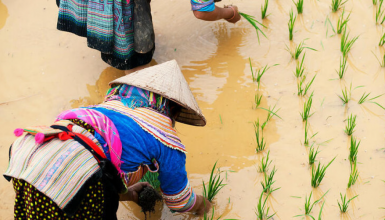
After two years of progressive work enhancing the meaningful engagement of indigenous peoples and local communities in climate policy and action, the Facilitative Working Group (FWG) of the Local Communities and Indigenous Peoples Platform (LCIPP) held its 5th meeting (FWG5) virtually from 21-24 June 2021. Looking towards COP26 this November, FWG5 gathered inputs from LCIPP contributors all over the world to review the progress of the platform and contribute to the draft of the LCIPP's second 3-year workplan.
The meeting also welcomed Hindou Oumarou Ibrahim and Thomas Cameron as newly elected co-chairs, and Tuntiak Katan and Alick Bulala Muvundika as vice co-chairs. The FWG is unique in its design, featuring a balance between seven representatives of indigenous peoples across the UN indigenous socio-cultural regions and seven Party representatives. The body annually elects two co-chairs and two vice co-chairs from amoung its 14 representatives, serving for a term of one year each.
Following the election, the FWG reviewed progress underway in the LCIPP's initial 2-year workplan (2020-2021). Members and participants heard updates on all of the 12 activities, 11 of which are near completion. Activities are clustered under the three functions of the LCIPP: knowledge, capacity for engagement, and climate change policies and actions. The completion of these activities leading up to COP26 further facilitates and strengthens the participation of indigenous peoples and local communities in the international climate policy process.
During the second half of the meeting, FWG members and LCIPP contributors proposed ideas for the draft of the second 3-year workplan of the LCIPP, for the period 2022-2024. Parties will consider the draft workplan at COP26 this November. The adoption of the next workplan will maintain and strengthen the platform's momentous progress since Paris 2015, building on the experience from the initial 2-year workplan. The adoption and implementation of the new workplan will also strengthen the historic alliance, where indigenous peoples and local communities work alongside Parties to address climate change, and ultimately help bring people and their experiences together to build a climate-resilient world for all.
The FWG5 meeting was open to all contributors of the LCIPP and livestreamed to the general public. Watch the full session here.
Curious about how you can get involved and learn more about the work of the FWG? The 6th meeting of the Facilitative Working Group (FWG) is scheduled to take place between 28-30 October prior to COP26 in Glasgow. Contributors from across the world are encouraged to register in advance of the meeting and attend. For more information on FWG6, check the FWG6 event page, or subscribe to updates on LCIPP events.


